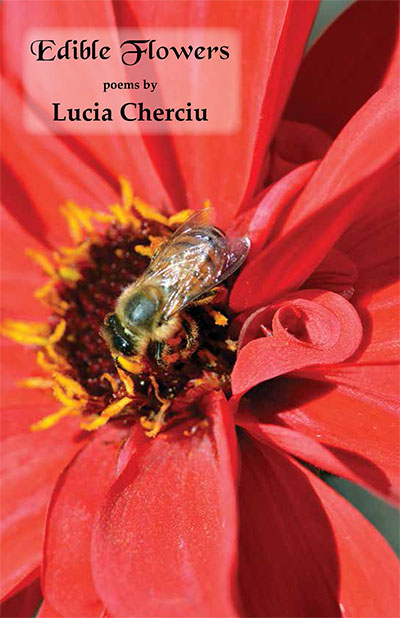poems by
Lucia Cherciu
ISBN: 978-1-59948-515-7, 64 pages, cover price: $14
Release date: February 24, 2015
$14.00
poems by
ISBN: 978-1-59948-515-7, 64 pages, cover price: $14
 Lucia Cherciu is a Professor of English at SUNY / Dutchess in Poughkeepsie, NY. She was born in Romania and came to America in 1995. She has a Ph. D. in Literature and Criticism from Indiana University of Pennsylvania and is the author of the books of poetry Lepădarea de Limbă (The Abandonment of Language), Editura Vinea 2009, and Altoiul Râsului (Grafted Laughter), Editura Brumar 2010. Her poetry appeared in Connecticut Review, Cortland Review, Interdisciplinary Studies in Literature and the Environment, Paterson Literary Review, Pro Saeculum, Timpul, and elsewhere. Her poetry has been nominated for a Pushcart Prize and for Best of the Net. She lives in the Hudson Valley with her husband and two-year old daughter.
Lucia Cherciu is a Professor of English at SUNY / Dutchess in Poughkeepsie, NY. She was born in Romania and came to America in 1995. She has a Ph. D. in Literature and Criticism from Indiana University of Pennsylvania and is the author of the books of poetry Lepădarea de Limbă (The Abandonment of Language), Editura Vinea 2009, and Altoiul Râsului (Grafted Laughter), Editura Brumar 2010. Her poetry appeared in Connecticut Review, Cortland Review, Interdisciplinary Studies in Literature and the Environment, Paterson Literary Review, Pro Saeculum, Timpul, and elsewhere. Her poetry has been nominated for a Pushcart Prize and for Best of the Net. She lives in the Hudson Valley with her husband and two-year old daughter.
As if bringing a statue to life, Lucia Cherciu’s Edible Flowers gives breath to Romanians whose voices were silenced by Nicolae Ceauşescu’s Communist dictatorship. Bread and milk were doled out and “a book alone could put you in prison or forced labor.” Despite physical and emotional damage inflicted from 1967 to 1989, subjects of Cherciu’s poems are a testament to the power of the human spirit. Men who “stole a sheep in a Mercedes” also “never failed to stop for hitchhikers, trusting” and traded “land with no papers.” Family, both living and dead, anchor Romanian men and women who “scuttle to care for the elderly” because they believe they will carry “word to their departed” when they die. Believing “that work made a winter day worthwhile,” women and men toil to make a plant grow even though they have to use prayer rather than water for a garden. The love of one generation for the next also cements the deep rootedness of Romanians. One particularly moving poem is about a son who slept with his father’s wrist tied to his in order to protect him. Cherciu confronts memories that are often raw, but places events such as women jumping “fences at night to steal bulbs of gladioli from a stingy widow” in context in order to define a complex culture. Transcending both time and geography, never sentimental or dogmatic, Edible Flowers are songs of compassion for human longing, human dreams that go unfulfilled of lives that had to live without closure. Spiritual yet visceral, offering the consolation of an intelligent human spirit who speaks of the past that continues to flail at the heart, Cherciu struggles with blackness and is not broken. Connecting the dots of her Romanian heritage, Cherciu teaches us that what can persevere through even the most brutal regime is the force that cannot be silenced–the human heart. –Vivian Shipley, author of All of Your Messages Have Been Erased
In Edible Flowers, Lucia Cherciu writes, “Inside, the tour guide/told us she had two stories:/one for foreign tourists/and one for the Romanians/in the room” (“A Tour of the Ceauşescu’s Palace”). But Cherciu has many stories, in poems lyric and historic, personal and political. “Leftover Communism in December” states, “Someone buys oranges/and holds a carnation/under the sweater/so it doesn’t freeze/on the way to a friend.” The poems in this collection have traveled great distances to be with us, and they will stay. –Suzanne Cleary, author of Beauty Mark
Lucia Cherciu writes in the title poem of her wonderful new collection, Edible Flowers: “Being a foreigner means / you can’t scavenge for plants…” Or, put another way, for immigrants there is always peril that attends negotiating a new world. Romanian raised and resident of the United States, Cherciu is keenly aware of the challenges of trying to straddle multiple continents, histories, languages, families. In the Soviet era, there existed a state-sponsored condemnation of material things. But in poem after poem Cherciu salvages memory through the objects by which we learn to love and dread the world: a censored novel creating an underground community of readers, a grandfather’s handsome hat purchased with a fistful of hoarded communist bills, the carcass of a Dacia automobile carted through town, a glass of plum brandy, Ceaușescu’s palace haunted by the memory of “the macabre wooden tongue.” These poems ache within their own private economy of loss for the children who have left their homeland and, at times, are filled with wonder at the enduring resilience of the human heart to survive. —Mauricio Kilwein Guevara
My grandfather used to save
money in a jar,
wads of oversized, rancid, communist bills,
hide the jar under his bed,
stash it beneath the cheese press
and then constantly worry
and lose it,
then accuse everyone he knew of robbing him blind
till it showed up again
carefully pushed behind the salt rock
for the cows to lick all winter long.
My father used to save
all the painfully earned, pitiful money
he should have drunk with his comrades
and in ten years
with all that sweaty money
kept safely in the communist bank
he was able to buy himself
a dashing hat
when the inflation hit hard.
They stole a sheep in a Mercedes
right through the middle of the town.
To carry the carcass of an old Dacia
they perched it on top of the horse cart.
They transported a pig in the trunk,
the goat in the back seat,
its beard hanging out the window
as it bleated at passersby at the light,
freshly cut alfalfa for the new calf
and stacks of cheese for the market,
sour milk curdling in the upholstery
of the chairs, streaming into a puddle
on the floor. Even if they already
had three passengers, they never failed
to stop for hitchhikers, trusting,
the way one prays for rain:
public transportation, divine.
And yes, in winter storms
when the whole mountain shut down,
they carried their grandma
in their narrow cars, the coffin
laid out head first, seats down.
Trains packed, windows frozen.
A peasant with a live rooster on her lap
sits next to a delicately made up blonde
with tall boots and short skirt.
An old woman wears a shawl
over her scarf over her coat.
Her clothes smell of wood fires
in a big stove.
In the store windows,
beets and canned beans
past expiration date. The milky
sound of snow falling on the roof
of a an old truck that brought bread
from the factory, hardened by frost,
burned under the watch
of a worker sleeping
next to the conveyor belt.
Stray dogs whimper in the corner,
wait for someone coming into the store
to alleviate the emptiness chewing
their gut.
Someone buys oranges
and holds a carnation
under the sweater
so it doesn’t freeze
on the way to a friend.
The cold apartment
speaks of high heating bills and no heat,
frost seeping through indoor coats.
Mulled wine spiced with black pepper;
walnuts and tea, home-made preserves.

